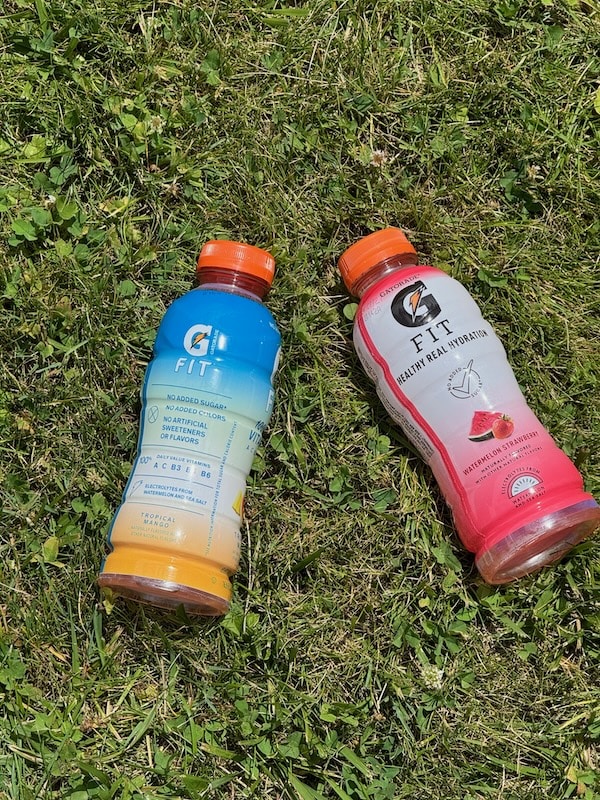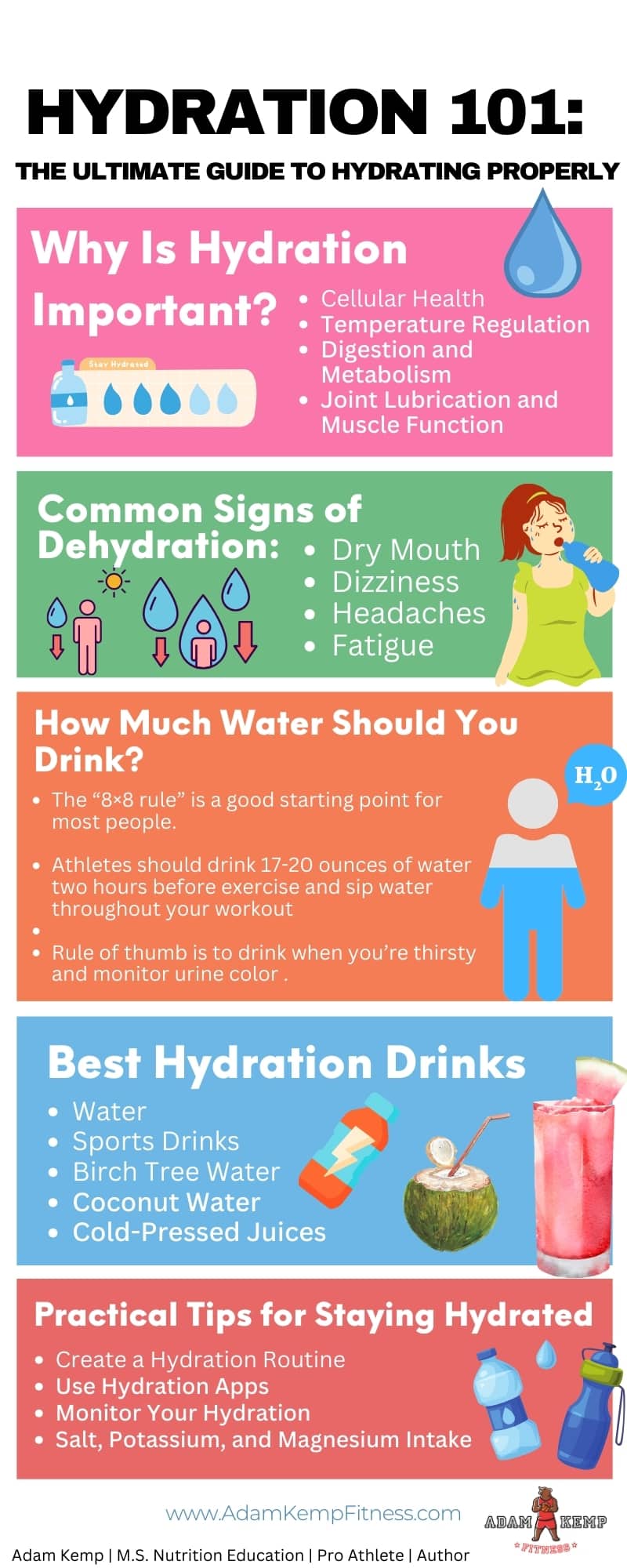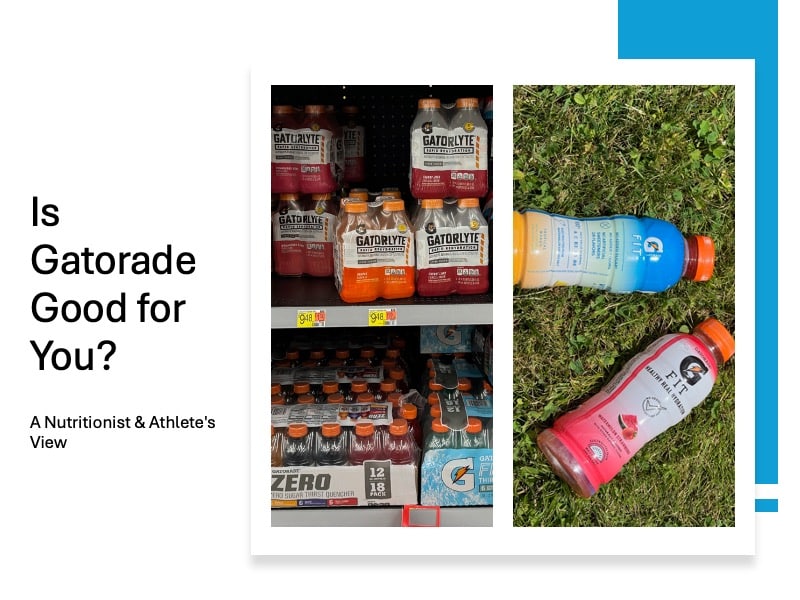Is Gatorade Good for You? A Nutritionist & Athlete’s View
Gatorade is one of the most well-known sports drinks, trusted by athletes and casual drinkers alike for hydration and electrolyte replenishment. But is Gatorade actually good for you?
While it can be beneficial in certain situations, its high sugar content and artificial ingredients raise concerns about regular consumption.
Although Gatorade offers healthier options like Gatorade Zero and Gatorade Fit, traditional Gatorade is too high in sugar, making it a less-than-ideal choice.
Kids and athletes should avoid it and opt for cleaner hydration drinks with lower sugar and more natural ingredients.
What Is Gatorade?
Gatorade is a sports drink designed to replenish electrolytes, carbohydrates, and fluids lost during intense physical activity.
It was originally developed in 1965 by researchers at the University of Florida to help the school’s football team, the Florida Gators, stay hydrated in extreme heat—hence the name “Gatorade.”
Today, Gatorade is one of the most recognized sports drinks worldwide and is marketed as a hydration and recovery beverage for athletes.
It has expanded into a variety of product lines, including Gatorade Zero, Gatorade Fit, Gatorlyte, and Gatorade Energy Chews.
While Gatorade is effective at replacing lost electrolytes like sodium and potassium, it has been criticized for its high sugar content and use of artificial ingredients in its original formula.
Newer versions, such as Gatorade Fit, cater to more health-conscious consumers by using natural ingredients and lower sugar content.
Whether Gatorade is a good choice depends on who is drinking it and when—it can be beneficial for athletes but may not be necessary for everyday hydration.
Who Owns Gatorade?
Gatorade is owned by PepsiCo, which acquired the brand in 2001. Under PepsiCo’s leadership, Gatorade has expanded its product line to include Gatorade Zero, Gatorade Fit, and Gatorade Energy Chews to meet the needs of different consumers.
What Is in Gatorade? Ingredient Breakdown

Gatorade was originally developed in 1965 to help athletes replenish fluids and electrolytes lost through sweat. The standard Gatorade formula includes:
- Water – The base of the drink, essential for hydration.
- Electrolytes (Sodium & Potassium) – Helps maintain fluid balance, muscle function, and nerve signaling.
- Sugar (Sucrose & Dextrose) – Provides quick energy but can contribute to blood sugar spikes.
- Artificial Flavors & Colors – Enhances taste and appearance but raises concerns about long-term health effects.
- Citric Acid – Adds tartness and helps preserve the drink.
- Preservatives (Such as Monopotassium Phosphate) – Prevents spoilage and maintains shelf life.
While Gatorade’s electrolyte content makes it useful for athletes and those sweating excessively, its high sugar levels (36g per 20-ounce bottle) can be excessive for the average person and are the primary reason I suggest people choose other natural hydration drinks instead.
Does Gatorade Have Electrolytes?
Yes, Gatorade contains sodium and potassium, two essential electrolytes that help regulate hydration and muscle function.
Some versions, such as Gatorade Fit, also include magnesium and calcium, which play additional roles in muscle contractions and nerve signaling.
Electrolytes are critical for hydration, especially in hot weather or after intense physical activity, but they can also be obtained from natural sources like bananas, coconut water, and leafy greens.
Does Gatorade Have Caffeine?
No, Gatorade does not contain caffeine in any of its traditional or low-calorie formulations.
While some energy drinks combine caffeine with electrolytes, Gatorade focuses solely on hydration and carbohydrate replenishment.
If you’re looking for an electrolyte drink with a caffeine boost, options like Celsius energy drinks contain some electrolytes and additional caffeine.
Does Gatorade Expire?
Yes, Gatorade has an expiration date printed on the bottle.
While it won’t spoil immediately, the flavor, color, and nutrient content may degrade over time.
Opened bottles should be consumed within 24–48 hours for the best taste and quality.
Is Gatorade Good for Dehydration?
Gatorade can be effective for replenishing fluids and electrolytes after significant sweating, vomiting, or diarrhea. The sodium in Gatorade helps retain water, preventing further dehydration.
However, water is still the best choice for everyday hydration. Gatorade should only be used when electrolyte replenishment is necessary, such as during prolonged exercise or illness.
For mild dehydration, coconut water or an electrolyte-enhanced water like Smartwater may be a healthier alternative.
Gatorade Zero vs. Gatorade Fit: Are They Healthier?
Gatorade offers lower-calorie alternatives to its traditional sports drink, but how do they compare nutritionally?
Gatorade Zero
- Calories: 0
- Sugar: 0g
- Sweeteners: Sucralose and acesulfame potassium (artificial sweeteners)
- Electrolytes: Sodium and potassium
Gatorade Zero eliminates sugar but replaces it with artificial sweeteners, which can cause digestive issues for some people. It’s a better choice for those avoiding sugar, but it may not be the healthiest long-term option.
Last update on 2025-07-04 / This article includes affiliate links/Images via Amazon Product Advertising API. I may earn commissions on purchases made through these links.
Gatorade Fit
- Calories: 10 per bottle
- Sugar: 1g
- Sweeteners: Stevia
- Electrolytes: Sodium, potassium, magnesium, and calcium
- Added Nutrients: Vitamins A, C, B3, B5, and B6
Gatorade Fit is a more natural option, using stevia instead of artificial sweeteners. Although I am not a fan of traditional Gatorade, I believe Gatorade fit is one of the best sports drinks as it also provides additional vitamins and minerals, making it a healthier choice than both traditional Gatorade and Gatorade Zero.
Last update on 2025-07-04 / This article includes affiliate links/Images via Amazon Product Advertising API. I may earn commissions on purchases made through these links.
Is Gatorade Bad for You?
Drinking Gatorade occasionally is not harmful, but frequent consumption can lead to negative health effects, such as:
- Weight gain – High sugar content can contribute to excess calorie intake.
- Blood sugar spikes – Sugary drinks can lead to insulin resistance over time.
- Artificial ingredients – Some versions contain artificial sweeteners and colors, which may impact long-term health.
If you need electrolytes, Gatorade Fit is the best choice among Gatorade products, but there are also healthier alternatives to Gatorade available.
Best Gatorade Alternatives
If you’re looking for a healthier sports drink, consider these options:
- Coconut Water – Naturally rich in potassium and low in sugar, making it a great natural electrolyte source. It also contains antioxidants and can aid in hydration without artificial additives. However, I don’t always recommend coconut water for athletes because athletes who sweat a lot will not benefit from the potassium-rich, low-sodium coconut water.
- LMNT Electrolytes – A sugar-free electrolyte mix with high sodium, potassium, and magnesium, designed for those following a low-carb or keto diet. Its balanced formula supports hydration during intense workouts and prolonged physical activity.
- Momentous Fuel – Designed for athletes, providing both electrolytes and carbohydrates to support energy levels and recovery. It also contains essential amino acids, making it an excellent choice for endurance and strength athletes.
- Prime Hydration Drinks – Low-calorie and naturally sweetened with coconut water, offering a cleaner alternative to traditional sports drinks. Be cautious not to drink more than one per day, as its vitamin A content reaches 100% of the RDA, which could lead to excessive intake over time. In most situations, I believe Prime is healthier than Gatorade.
- Smartwater+ Electrolytes – A clean, no-sugar electrolyte water for daily hydration, making it ideal for those who want electrolyte support without artificial ingredients. It provides a smooth taste and is widely available for convenient hydration on the go.
Last update on 2025-07-04 / This article includes affiliate links/Images via Amazon Product Advertising API. I may earn commissions on purchases made through these links.
Final Verdict: Is Gatorade Good for You?
Gatorade can be beneficial for hydration and electrolyte replenishment in specific situations, such as intense exercise, illness-related dehydration, or extreme heat.
However, the high sugar content and artificial ingredients in traditional Gatorade make it less ideal for everyday consumption.
For a healthier option, Gatorade Fit is a better choice, but there are also natural alternatives that provide electrolytes without the unnecessary additives.
If you’re not engaging in prolonged or intense activity, plain water remains the best choice for staying hydrated.

Read Next: Hydration Tips for Athletes
This website does not provide medical advice. This website site does contain affiliate links, and purchases may earn a commission.
Read my Medical Disclaimer, Review Disclaimer, and Publishing Policies for more details. Use of this site indicates acceptance of these terms.






